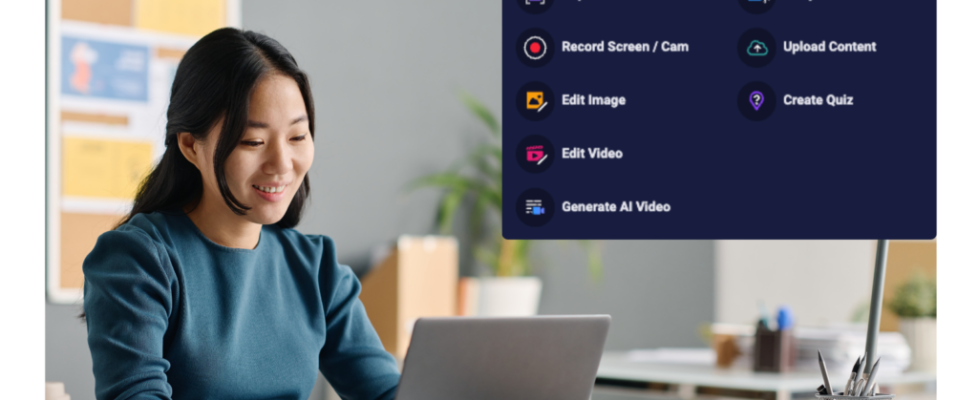Venezuela. Just seeing the county’s name sparks complicated thoughts for those around the world watching it closely. As the lights dim around the country there is one man, at a public university who is fighting to shine the light for future generations. Meet Jesus Sosa. English instructor, moderator, and head of the Department of English at the Universidad de Los Andes in Venezuela. Sosa is a language arts teacher and has embraced video technology in his classroom.
Sosa teaches other educators on how to use video so they can utilize it within their own classrooms. It’s a format he’s helping his students embrace as they prepare to bring new languages to their prospective students.
Sosa is a fan of flipped learning and appreciates the video component of the lessons. He was the first to bring this concept to the university. “I was the first one who started studying a custom flipped approach and how to use video,” he said. Sosa believes video connects teachers to students in ways they haven’t been able to before.
Easy Creation of Videos Inspire Teachers
He found ScreenPal’s video tools after a quick search on the internet. “I saw that it was really easy to use, and I said well, this is something that we’ll appreciate, and I took it for a test run. They (students) liked it so much I kept using it.” Soon, videos became a part of the curriculum. He has created videos for his whole department to utilize.
 He challenged his teachers to make videos of their own, but he was met with some resistance. He had teachers doubting their on-screen abilities. However, they eventually had a change of heart. “Once they get to use it with their students, they say, ‘I love it. I want to keep using it to get better.’ That’s as much as you can expect from future teachers,” he says. Now, his teachers are inspired to create videos for their classes. They work together and collaborate on concepts to improve their own videos. They leave class with a strong portfolio of work.
He challenged his teachers to make videos of their own, but he was met with some resistance. He had teachers doubting their on-screen abilities. However, they eventually had a change of heart. “Once they get to use it with their students, they say, ‘I love it. I want to keep using it to get better.’ That’s as much as you can expect from future teachers,” he says. Now, his teachers are inspired to create videos for their classes. They work together and collaborate on concepts to improve their own videos. They leave class with a strong portfolio of work.
His teachers create videos with ScreenPal’s video tools, “It’s the one I see them enjoy the most. It’s easy, it’s flexible, and they can do it without any issues,” says Sosa. It’s one less hassle they have to deal with in a country filled with issues.
Internet Issues Won’t Stop Teachers
As the Venezuelan government struggles to keep things together, the people carry on. Resilient in spirit, courageous in heart, they are folks that won’t let anything keep them down. Basic needs such as electricity, clean running water, and internet access aren’t always available. But Sosa says they are still able to make do.
Having a reliable internet connection is oftentimes impossible in certain parts of the country. “Internet issues are a serious thing. Most of the day, the internet just sometimes doesn’t work,” he stressed.
That’s where ScreenPal comes in. With a full download installation, users are able to access the video platform without using the internet. Teachers can continue creating videos despite internet issues and the everyday hardships they are all experiencing.
Video Reaches Rural Communities, Levels The Playing Field
 A video can reach communities living in rural areas of Venezuela. It’s something Sosa and his teachers have seen time and time again. Educational material is being brought to far-reaching communities, in areas where there is no gas or running water. With the use of video technology, children living in rural areas are given the same education as those living in the city. It levels the playing field for everyone.
A video can reach communities living in rural areas of Venezuela. It’s something Sosa and his teachers have seen time and time again. Educational material is being brought to far-reaching communities, in areas where there is no gas or running water. With the use of video technology, children living in rural areas are given the same education as those living in the city. It levels the playing field for everyone.
Parents are able to connect online (when the internet is working) and access video lessons for their children. They are able to download the video file so they can rewatch it even when the internet is down. “If the parent doesn’t know how to speak English, they will understand the video. They will understand the information. They will be able to help their kids with their homework,” Sosa explains.
His teachers receive immediate feedback from the children and their parents. “The teachers are so proud of their kids. The parents send them notes saying how much they enjoyed the video. Not all the kids get to go to class all the time because it’s difficult. So for them, video is something really nice from the teacher to be able to use. Even if it’s the same information they could get from anywhere. They appreciate that the teacher took the time to create the video and extend the lesson. They optimize class time and get to do activities, more communicative activities,” he said.
Video Saves Educational Costs
The costs for educational books and materials is oftentimes too much for students. According to Sosa, supplies are out of their budget for both the teacher and student. A simple video can help cut costs and provide the same educational material oftentimes found in a textbook. Video solves an economical issue.
“This helps teachers create materials, so students don’t have to make copies or buy books. Books have become so expensive. Teachers can’t use paper copies anymore. Creating video materials opens new doors of possibilities because it’s flexible and it’s something they can have even if they don’t have internet access. They can download the video and have it on their phones or laptops at home. Even if they have no internet connection,” Sosa said.
Sharing the Experience
Despite all odds, Venezuelans in educational languages at Universidad de Los Andes are thriving. By evolving their curriculum, and embracing tech in and out of the classroom, everyone wins.
“I just want to keep sharing this experience and keep having teachers to build this with. Flipped learning is for me. It’s an alternative to the many things that are happening in our country. We are taking baby steps to get to this point. Someday I hope to see they start using it more.”
Share Your Story
ScreenPal would like to thank Jesus Sosa and the many teachers he helps. Email our marketing team (marketing@screenpal.com) and share your story.
Quick Links
How video enhanced this company’s way of communicating

































